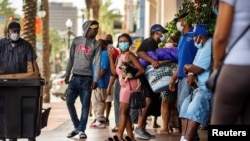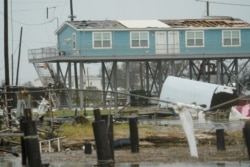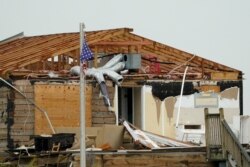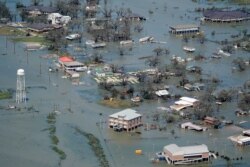As first responders continue a second day of search, rescue and support efforts in southwest Louisiana, a clearer picture of the damage caused by Hurricane Laura is emerging.
The state breathed a sigh of relief that the loss of life was not more severe -- the death toll is now 11 -- but the damage to population centers such as Lake Charles, a city with a population of 80,000, is devastating. Downtown buildings have been demolished, entire neighborhoods left in ruins and almost 900,000 homes and businesses are without power.
Residents are trickling in to assess the loss of personal property, but it may be days, weeks or months until many Louisianians can return home for good.
Finding temporary housing after a disaster is never easy, but some victims of the storm are saying the coronavirus pandemic has made the situation even more difficult.
“My husband and I are both in our 60s,” said Mary Gutowski, a retiree who moved to Lake Charles from Austin, Texas, less than a month ago. “I’ve been in the hospital three times in the last year, and we’re both very worried about being out in crowds and getting the virus. But we couldn’t stay home with a Category 4 hurricane coming at us. What are we supposed to do?” she asked.
Gutowski and her husband packed a bag with a few days’ worth of clothes and their face masks and decided to drive north in hopes of sidestepping the worst of the storm. They were able to avoid the most damaging wind and flooding but evacuating their home during a global pandemic has also produced challenges they did not anticipate.
Getting out
“It’s been a lot of worrying and a lot of crying,” Gutowski told VOA as she fought to hold back tears.
She said that when they left their home the day before the storm, they had no place to go. Gutowski and her husband began driving and immediately noticed many gas stations had been shuttered due to coronavirus, as well as a lot of rest stops where they could normally buy supplies or food.
“We were lucky to have a full tank of gas before we left or we might not have made it very far,” she said.
Typically, during natural disasters, cities set up emergency shelters. Because of the coronavirus pandemic, however, there are fears the virus would spread in such close quarters. Instead, state governments attempted to set aside thousands of hotel rooms across Texas and Louisiana for evacuees. Individuals, however, have reported having a difficult time finding available hotel rooms.
“I needed to stay somewhat close for work,” said Ashley Watkins, whose job is related to natural disasters, “and I still ended up hundreds of miles away in Alabama at the nearest pet-friendly hotel.”
Watkins said she sent her 6-year-old son to a slightly closer hotel in Texas with her parents and her other siblings.
To make matters worse -- in what’s become an all-too-common ritual for southwestern Louisianians over the last two days -- she received photos from friends confirming she no longer had a home to go back to.
“The house is destroyed down to the frame,” Watkins said. “Most of it ended up in some trees.”
Staying safe
“Costs are already adding up. I can’t keep paying for lodging like this,” Watkins said.
Gutowski and her husband agreed. They said they were finally able to find a hotel attached to a casino in Shreveport, Louisiana, for a few nights.
“If I didn’t have a discount from a player’s card, there’s no way I could have afforded this. I’m retired,” Gutowski said.
When the Gutowskis arrived at their hotel, they said it was filled to capacity -- something unheard of due to coronavirus protocols.
Many evacuees said they were afraid to risk their health with so many people around, so they have holed up in their hotel rooms for three straight days.
“The only room they could give us was up on the 21st floor and we can’t walk up and down those stairs,” Gutowski said. “You’re only supposed to have four people in the elevator at a time because of the virus, but people don’t follow the rules and they’re putting the rest of us at risk. So we just stay in our room. It’s suffocating.”
Next steps
However, Gustowski said, her biggest worry is what they’ll do next.
Their reservation ends Saturday, and as of Friday afternoon, they didn’t know where they would go. She said they cannot go back to Lake Charles. Fallen trees and other debris have made it impossible for friends to reach their neighborhood and check on the status of the Gutowski home. Every hotel she has called said they are full.
“I’ve spent hours trying to get in touch with anyone who can help,” she said. The Federal Emergency Management Agency “said they can’t do anything yet, and I couldn’t get through to the United Way or Red Cross,” she said, “So we’re on our own and we don’t know what to do.”
Some affected Louisianians will find family nearby they can stay with until they can go home or rebuild.
Watkins said she is hopeful this will be the case for her and her son. First, however, she said she plans to return to Lake Charles this weekend to see the damage to her home herself.
Those who can’t afford a hotel and don’t have family to stay with will either remain in their homes -- many damaged, and even more without electricity and water -- or will head to large emergency shelters that some fear will become coronavirus breeding grounds.
Officials hope large-scale screenings will ensure that isn’t the case.
“For everything that’s happened to us over the last few days, I still know there are people much worse off than we are,” Gustowski said. “I can’t imagine having to do this with young children or having to try to wait it out in your home without electricity.”
Friday evening, the Gustowkis got a little luckier. A hotel in Biloxi, Mississippi, called and said they had a room available for them for at least a couple of weeks.
“So that’s where we’ll head tomorrow, then,” she said. “It’s not close and we’d rather not stay in a hotel during a pandemic, but at least we have a place to stay. Relieved is an understatement.”







